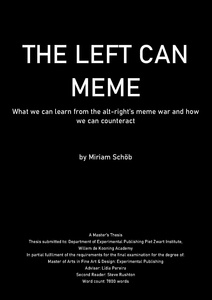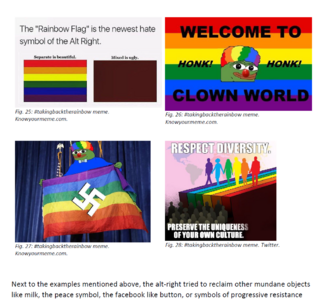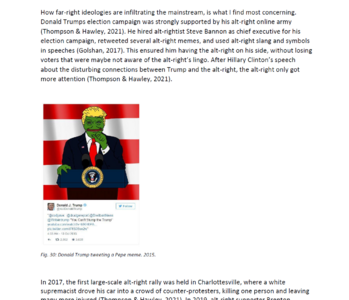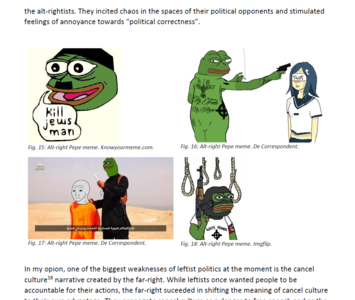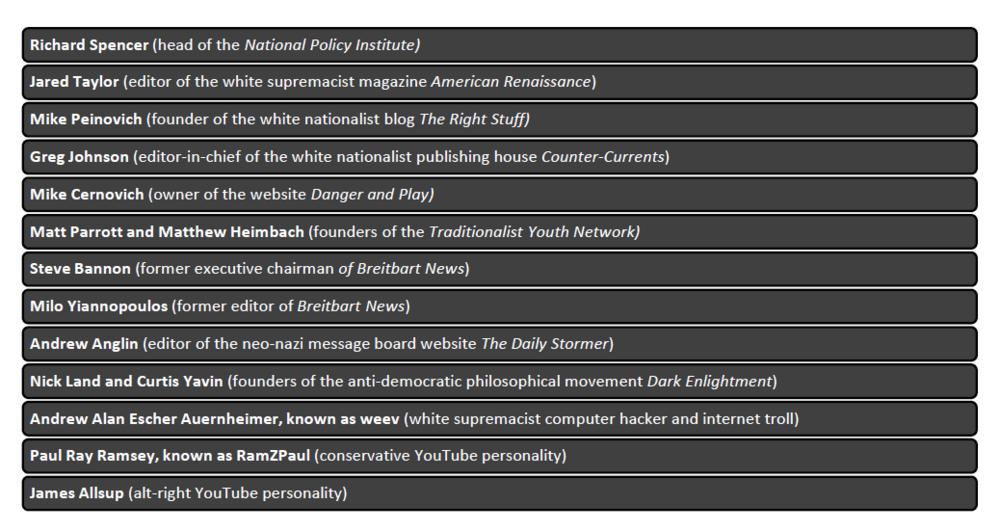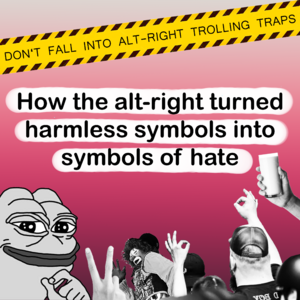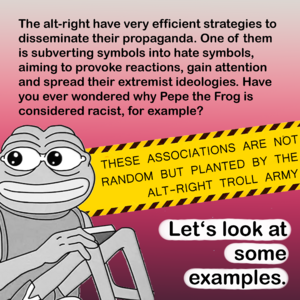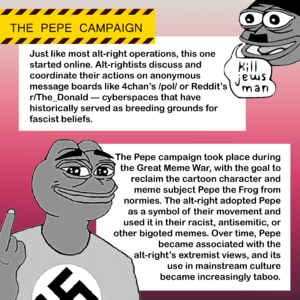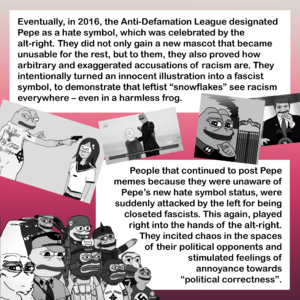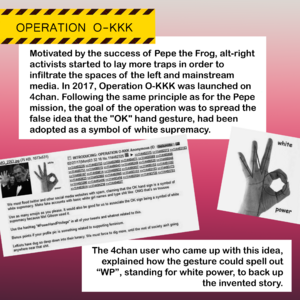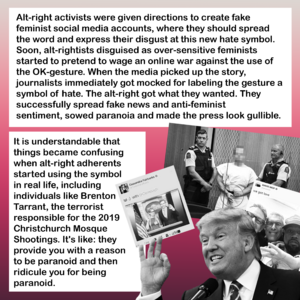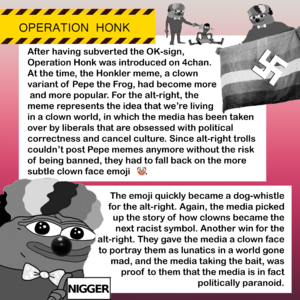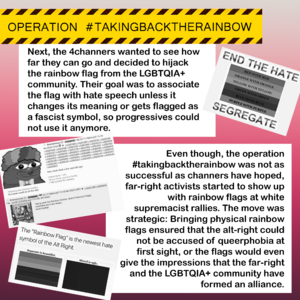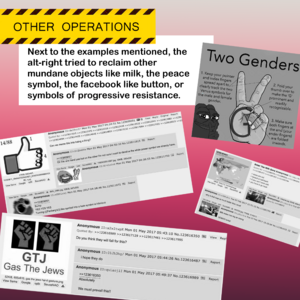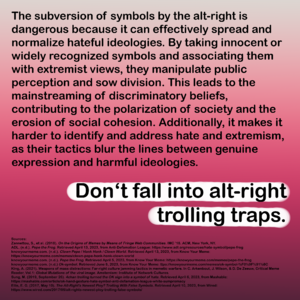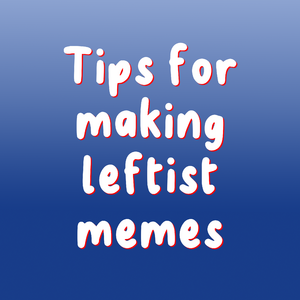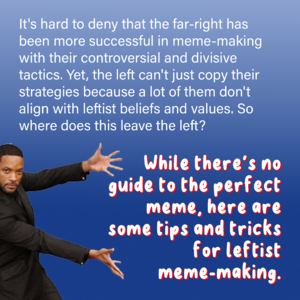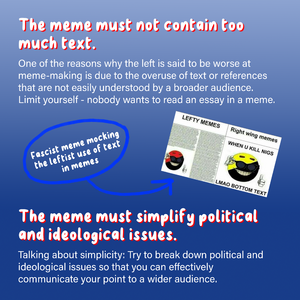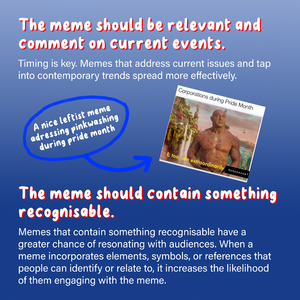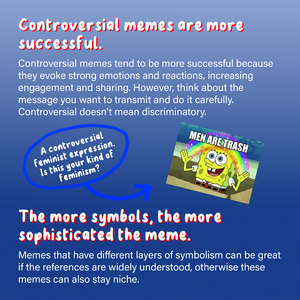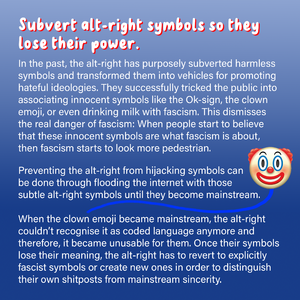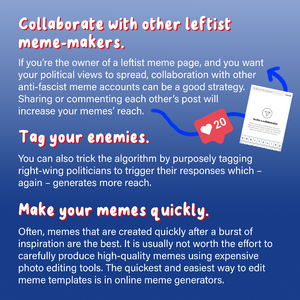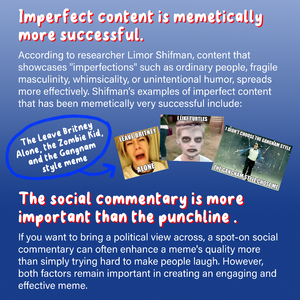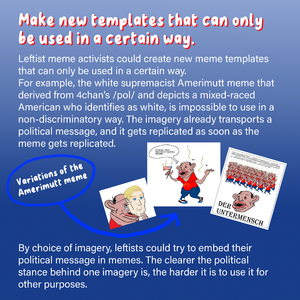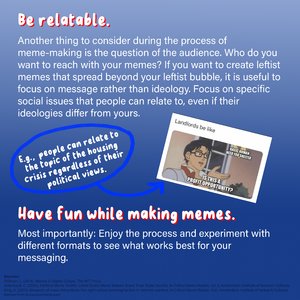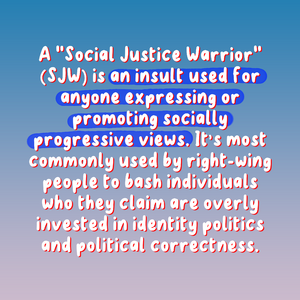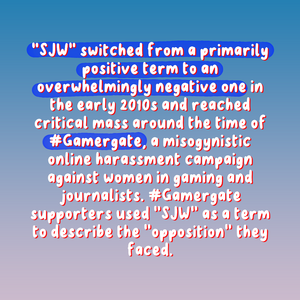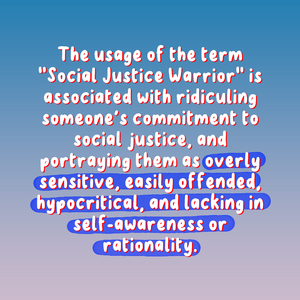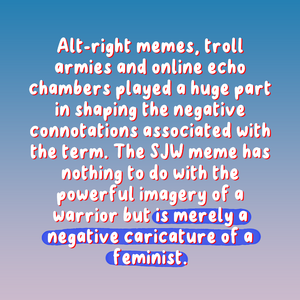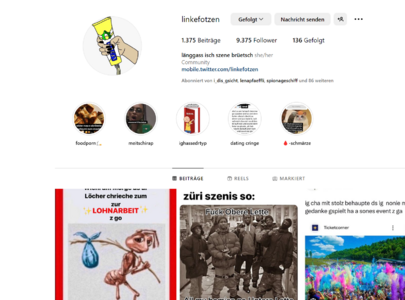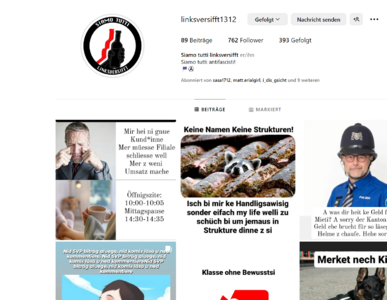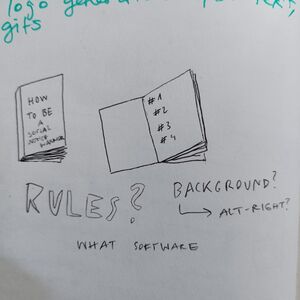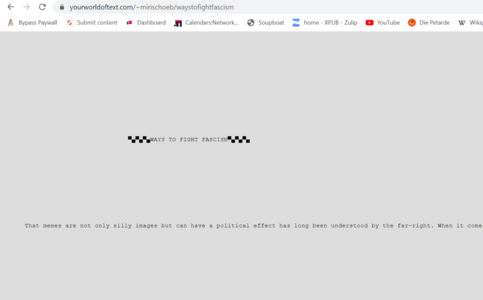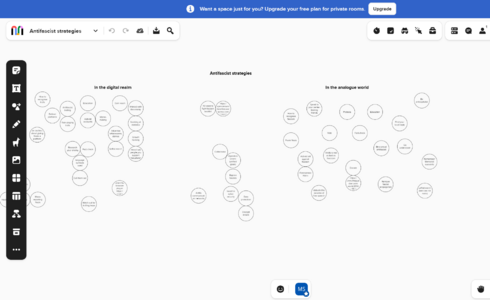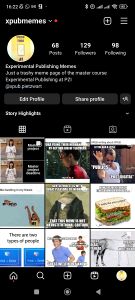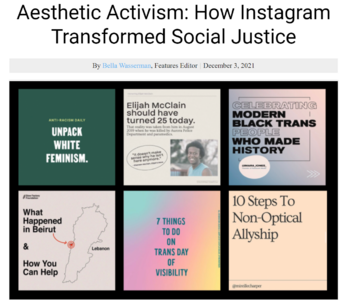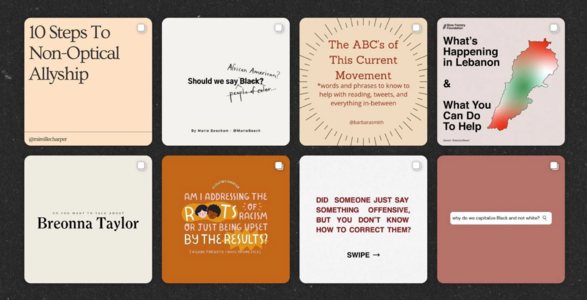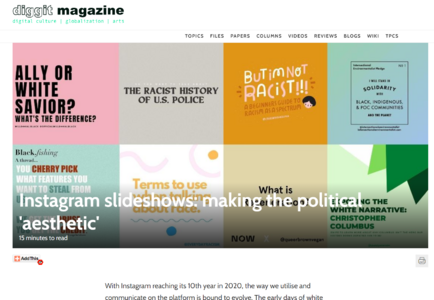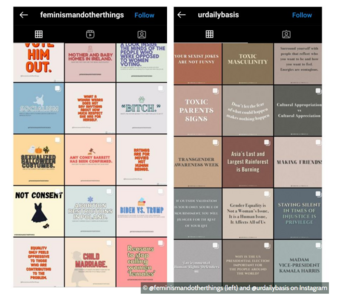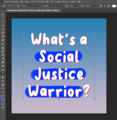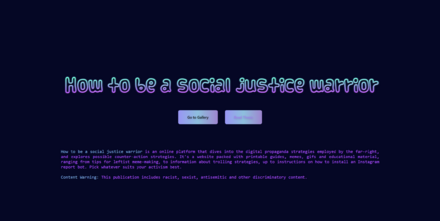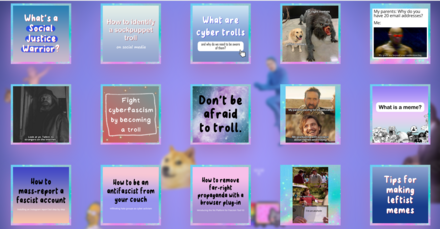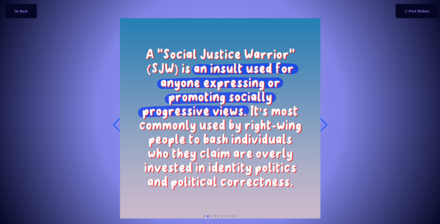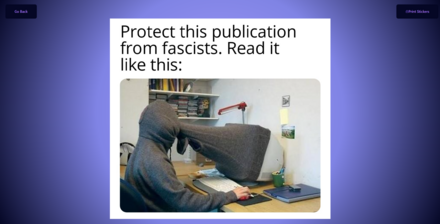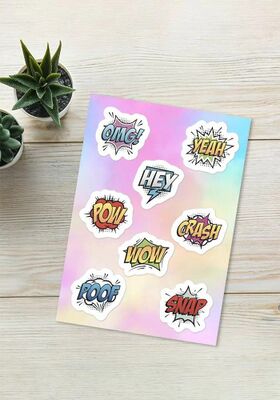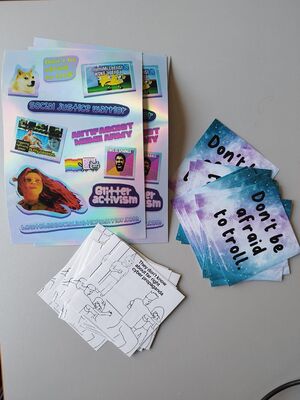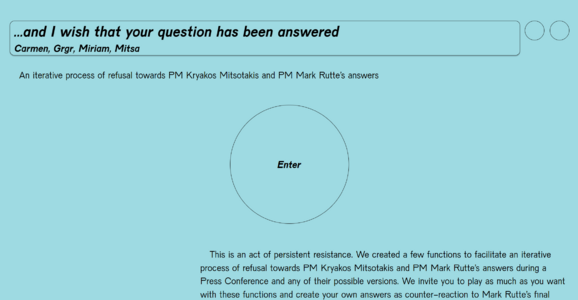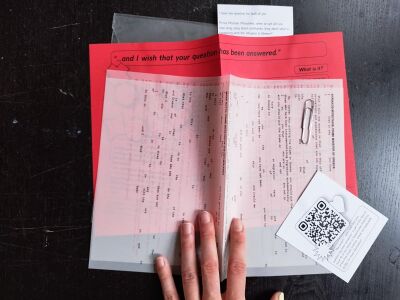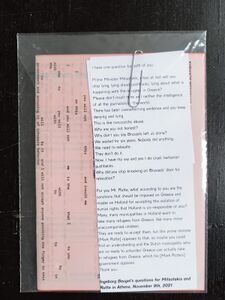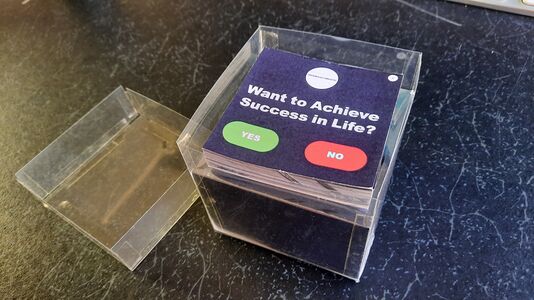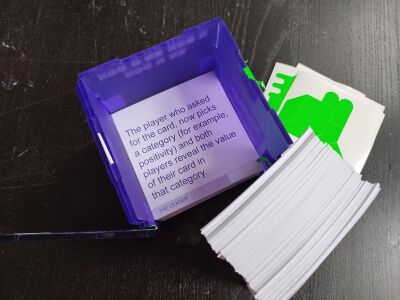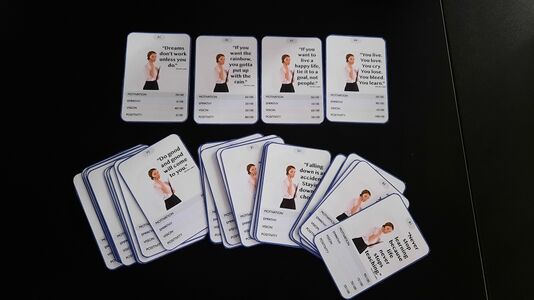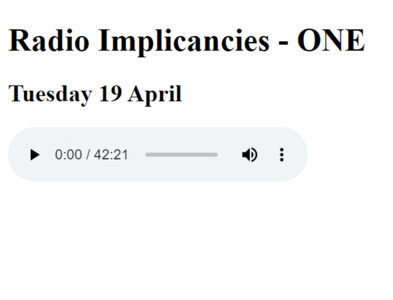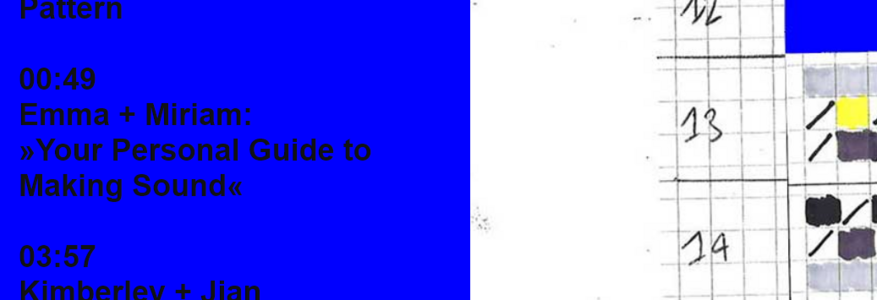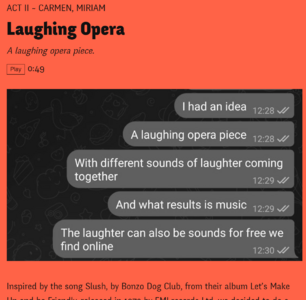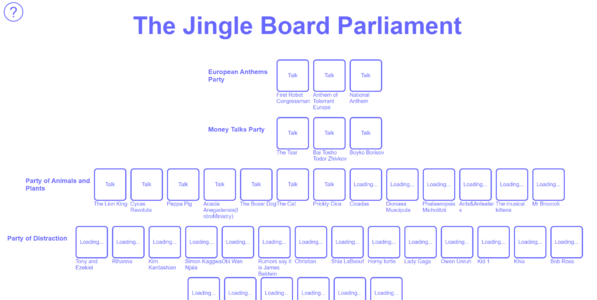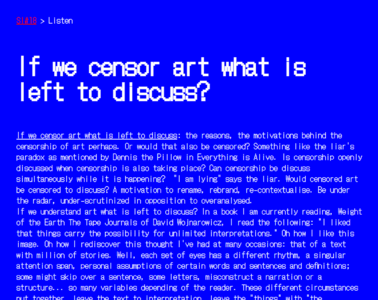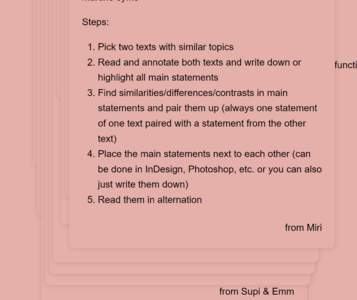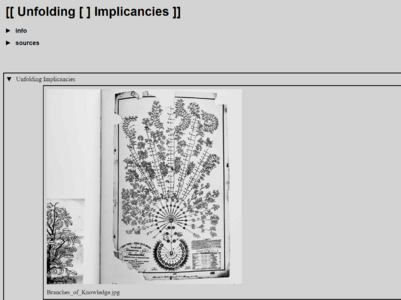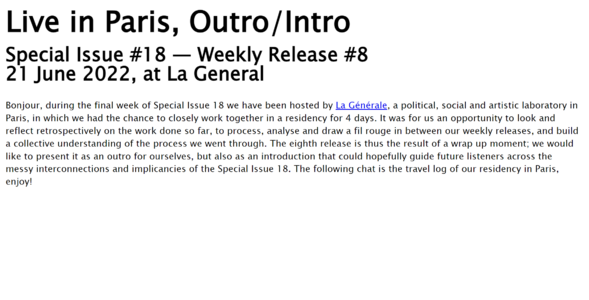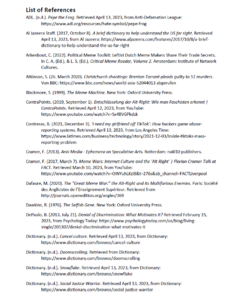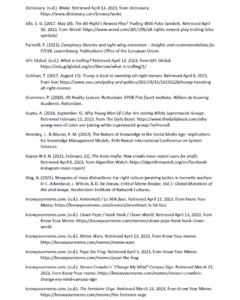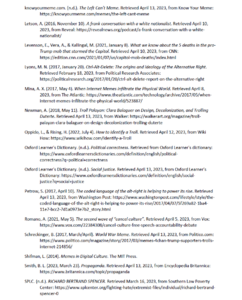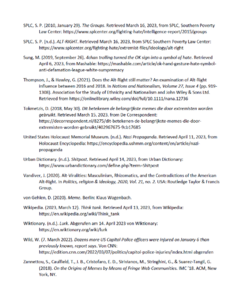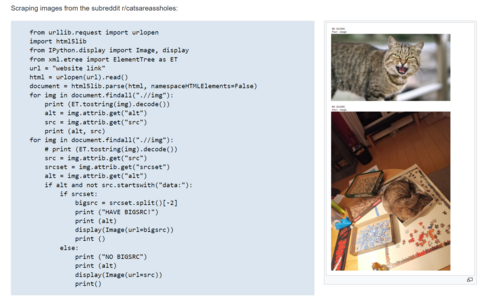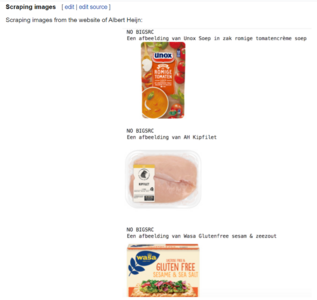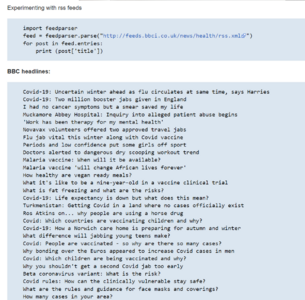User:Miriam/Final presentation
Content warning
CW: Racist, sexist, antisemitic, and other discriminatory memes.
My thesis
Miri's XPUB2 thesis outline
It all started with memes...
In the beginning, memes amazed me by the way they replicate, go viral, and serve as a way of communicating. I wondered if it might be possible to define a set of rules for memetic success that could be applied to activist strategies; using the power of imitation to reach most publicity. Then, I went down the rabbithole and learnt that the dissemination of memes is already very much a political tool on its own - but mostly used by far-right extremists. My thesis and project got more specific. I asked myself:
What can we learn from the alt-right's meme war and how can we counteract?
Thesis structure:
- Introduction
- The definition and concept of memes
- The Great Meme War of 2016
- Counteraction strategies - From a leftist, for leftist.
I described the concept of memes and how they can be weaponized in political warfare. Using the example of the Great Meme War of 2016, I analysed how memes and organised fascist activism on internet forums like 4chan led to the rise of the alt-right in the US and how memes influenced the global political landscape and the 2016 US presidential election. I discussed why the alt-right remains one step ahead when it comes to the creation and dissemination of weaponised memes, and dissected their memetic strategies. Then, I tried to illustrate possible counteraction strategies.
Who is the alt-right?
The alt-right is a loose coalition of nationalists, supremacists, monarchists, neo-reactionaries and even self-declared fascists. Most of the alt-right’s adherents are young, white, and male Americans or Western Europeans. They are a relatively new phenomenon although their ideas stay the same as mainstream racism, antisemitism, fascism, and misogyny. They believe that the Western civilization is under attack by multiculturalism and that the leftist “political correctness”, and “social justice” are used to weaken “white identity”. Alt-rightists reject common conservatism (as it’s not radical enough), embrace white ethnonationalism and often adhere to conspiracy theories.
Most alt-right adherents were exposed to the alt-right’s ideologies online, on message boards like 4chan’s and 8chan’s /pol/11, the sub-reddit r/The_Donald12 and platforms like Twitter. The alt-right's activism is characterised by the use of memes and trolling tactics. They plan and discuss specific online strategies and attacks on 4chan, an anonymous imageboard website. From there, they disseminate their propaganda across social media. Their memes are aimed at pushing fascist narratives, spreading disinformation, and provoking the media and the left. In 2016, they heavily supported Trump.
What are their meme strategies?
The alt-right uses leftists’ angry reactions to bigoted memes to further crank up their propaganda machine. The meme strategies of the alt-right work so well because they have no reputation to lose, while the left is expected to be the “good people” that react to discrimination. The alt-right can be as provokative and discriminatory as they want, because we wouldn’t expect any other behaviour from them. Fascists are no longer afraid to be called Nazis and their voices are still elected in parliaments. Also, the more the media falls into the traps of the alt-right, the more attention they get. The bigger their audience grows, the more violence is spread. This leads us to the question: How do we counteract?
Grad project
Research
The original idea of making a guide to memefy your life transformed into the idea of making a guide for leftist meme-making and eventually became how to be a social justice warrior.
Why not a guide for leftist meme-making?
The overarching problem of fascism cannot be solved through meme-making alone. I believe that possible counteraction strategies need to go hand in hand with the beliefs and values of the left, thus, we cannot just use the same strategies the alt-right use. For example, integrating swastikas in leftist memes in order to subvert the symbol’s meaning, would just be a reproduction of violence. Also, the left doesn't have any professional troll farms, nor do they use conspiracy theories and misinformation campaigns. It requires collective action that goes beyond meme-making to combat far-right cyber toxicity. Nevertheless, tips for leftist meme-making can still be found in my publication.
What's a social justice warrior?
I didn't want to publish a set of ultimate rules on how to be activist. Rather, I wanted my publication to be a collection of multiple things: activist strategies, educational material, interviews, memes, trolling experiences, interesting stories, book recommendations,... One big potpourri that serves as a source of inspiration instead of dictates one right way (because: who am I to determine how to solve fascism lol).
During my research I spoke to Swiss leftist meme-makers and asked them about their strategies.
Research on Swiss leftist meme makers
Interviews with leftist meme pages:
Also, I kept making memes and trolling around on the internet for my research. Mostly, I engaged in online discussions with other people in comment sections underneath news posts that discussed "controversial" topics (mostly feminism, queer rights and racism). I switched between using my normal account and a troll identity called Daniel. Daniel is the white cis intersectional feminist ally that I'd wish to see more often in comment sections in real life. When Daniel speaks up for women's rights, he gets more support and likes than I do. Daniel is more believable when he speaks facts. The less leftist slang, catchphrases, and inclusive language I would use, the more relatable I was and the more fruitful the conversations were. I found myself in a dilemma of asking myself how far I can go without abandoning my own personal beliefs.
At that point, I still thought I am working towards a printed publication, a small book. But it didn't seem right to print memes. So I was looking for alternatives and tried out different things...
Is it a book? Is it a map? Is it an Instagram account? Is it a box?
In the meantime, I started experimenting with text-based photos about the topic. There's this memetic trend on Instagram, that activists use this text-based "pastel panel" slide-show aesthetic. Regardless of what the format of the project will be, I wanted to talk in a digital native language.
With those poppy colors and the catchy text, I decided that this aesthetic only works digitally. I didn't want to deal with the politics of other platforms, so I knew that if I want to have an independant platform, I need to make it myself. That's when I decided that the format will be a website. howtobeasocialjusticewarrior.com was born!
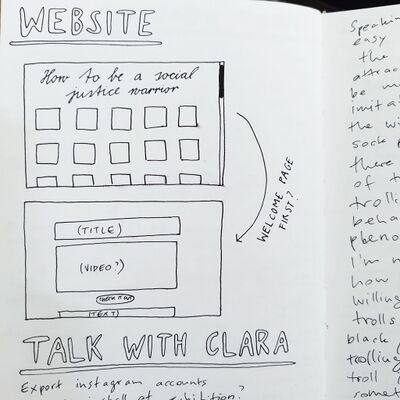
Thoughts on the aesthetics
I used to make jokes about the visual style of this activism, as it looks very much like a brand selling consumers a vision or ideology. But I think it makes sense to borrow stylstic elements popular within the capitalist sphere and co-opt them; it serves as an online political megaphone. This aesthetic has a greater chance to achieve virality (algorithmic activism), is accessible, allows you to break down complex issues, and playful fonts are also more readable for neurodivergent people. I used it as a strategy to look inviting. The dangerous part is when you start spreading misinformation and commodifying tragedies. But I researched well, fact-checked and listed my sources, and tried to find a tone that does not mock the issue.
Still, not finding a good balance between seriousness and humour stayed my biggest fear during the project. And it was indeed a fine line. For example, I am not sure if I achieved that balance in the infomercial I recorded for the grad radio. In retrospect, it may sound a bit like I am mocking the danger of fascism.
File:Infomercial miriamschöb.mp3
While working on the website, I tried out different things. At one point, the website was full with glittery heart gifs and sparkles and advertisements - sensory overload! While I liked that trash aesthetic and it also completely fit to the topic of memes, I decided to tone it down, so the website wouldn't become a caricature. It seemed like bad taste to have a heart rain next to an alt-right meme of Pepe shooting a Black person in the head.

I started making more of these text-based slide-shows, memes, and continued building the website.
Tools and softwares used?
I used very mainstream softwares and tools as this made the most sense for a project on memes. Memes are about taking already existing material.
Outcome
https://project.xpub.nl/howtobeasocialjusticewarrior/
https://howtobeasocialjusticewarrior.com/
If the far-right is able to mobilise people to be politically active in real life, to attend white supremacist rallies or to storm the capitol by means of memes, what could the left learn from the far-right’s cyber tactics? And how can anti-fascists counteract?
That memes are not only silly images but can have a political effect has long been understood by the far-right. When it comes to the creation and dissemination of weaponised memes, they are unquestionably ahead of the left-wing. Backed up by a powerful network and well-coordinated organisational structures, fascist trolls have not only managed to infiltrate political neutral spaces, but also the ones of the left. When white supremacists are manipulating elections by means of memes, sockpuppet trolls are paid to spread disinformation online, and right-wing troll armies successfully conquer online territories, the battle against fascism extends beyonds the streets.
"How to be a social justice warrior" is an online platform that dives into the digital propaganda strategies employed by the far-right, and explores possible counter-action strategies. It's a website packed with printable guides, memes, gifs and educational material, ranging from tips for leftist meme-making, to information about trolling strategies, up to instructions on how to install an Instagram report bot. Pick whatever suits your activism best.
This publication is an attempt to equip you with tools to identify, address and combat cybertoxicity and fascism, in the digital realm as well as in the analogue world. If you decide to use any of the activist strategies presented, I suggest to ask yourself what exactly you want to reach with your actions, and to set your moral compass. Not all strategies may be without risk, nor can they guarantee success. The fight against fascism depends on broader societal efforts and requires stamina and collective action. Use this publication as a source of inspiration for your activism and as a resource to support your journey.
Content Warning: This publication includes racist, sexist, antisemitic, and other discriminatory content.
Grad show and further plans
- Printable sticker sheets for the print button
- Screen installation
- Continue website like a blog! There's so much to talk about! Maybe start making videos on the topic and include them.
- More stickers for the exhibition
- Meme talk & workshop at Milieudefensie
Individual contributions to the Special Issues
SI16
My role
- Worked with my subgroup on the code for the language filter of "...and I wish that your question has been answered."
- Creating altered versions of our origin text
- Printing and binding of the "...and I wish that your question has been answered." zines
- Organisation and set up of the launch with the launch event team
- Proof-reading publication texts
Subgroup project
...and I wish that your question has been answered. https://hub.xpub.nl/soupboat/si16/projects/and-i-wish-that-your-question-has-been-answered/
Our tool is a filter to process and alter texts. By targeting specific words and replacing them, either for another word, for specific characters or for blank spaces, the reader or user of the tool can change the text in many ways. The tool includes three functions The function “respell” receives as input a text (string type) and substitute all the occurrences of a target word with a replacement chosen by the user. The function “stitch” is very similar to the previous one but replaces all the occurrences of a target word with a single character (it can also be a blank space) that is repeated as many times as the length of the target. The third function “reveal” also works very similar but deletes all input text except the target word(s) and replaces the deleted text with blank spaces.
SI17
My role
- Taking care of the SI17 finances
- Creating a card game as well as a collection of life hacks for the loot box content
- Creating the loot box reveal audio track: File:Loot Box Reveal (online-audio-converter.com).mp3
- Making a game music playlist for the launch
- Organisation and set up of the launch
- Creation of Fage Not Pound timezone with Kim, Emma, Chae: Fage Not Pound
Final project
This box found your for a reason: https://issue.xpub.nl/17/index.html
SI18
- 1: Radio Miriam Schöb
- 2: Your Personal Guide To Make Sound (in collaboration with Emma)
- 3: Laughing Opera (in collaboration with Carmen)
- 4: The Jingle Board Parliament (in collaboration with Erica and Mitsa)¨
- 5: Rap parody/experiment on the given sentence "If we censor art what is left to discuss"
- 6: Diffracitve reading of the following texts: No Congo, No Technologies by Oulimata Gueye and The Mundane Afrofuturist Manifesto by Martine Syms
- 7: Unfolding implicancies (in collaboration with Jian and Emma)
- 8: Live sound jam at La Générale, Paris
Development of reading/writing practice across the 2 years
I guess.. I read and wrote a lot during the past two years lol? Still struggling to find a good writing style in English which sometimes gets frustrating because I write a lot in (Swiss-)German and there I know what I want to sound like. I had to write a lot for my master project and I chose a more or less neutral tone because as soon as I try to write a bit more emotionally, it immediately sounds very dramatic or naive or partisan. But here a list of experiments and projects that included writing/reading:
For more detailed information go here: User:Miriam
SI16:
- Very important rules experiment
- Several text experiments in Steve class
- text alteration
SI17:
- Fan fiction exercise: https://pad.xpub.nl/p/fanfiction_jian_al_miri
- Miri the leader quartets game
- Life hacks
SI18:
- Notation experiment: https://pad.xpub.nl/p/notation_experiment_0420
- Radio Miriam Schöb
- Your Personal Guide To Make Sound (in collaboration with Emma)
- Rap parody/experiment on the given sentence "If we censor art what is left to discuss"
- Diffracitve reading of the following texts: No Congo, No Technologies by Oulimata Gueye and The Mundane Afrofuturist Manifesto by Martine Syms
XPUB 2nd year:
- Graduation proposal
- Project proposal
- Thesis
- Project
- Infomercial for Grad Radio
Thesis reading:
...and way more reading for the project.
Development of prototyping practice across the 2 years
So, I was really a complete programming noob when I came here. I remember the first day of school, Aymeric asked everyone to answer a few fun questions on a pad, so that we all get to know each other better. One of the questions was "What's your favourite software?" and I completely panicked because I didn't know the definition of software and what counts as software, and thought "OMG i can't ask what a software is, this question is way to stupid to ask on the first day" hahahaha so I googled "software" and Aymeric came up to me and asked if I was already finished because he saw me on my phone and I felt super awkward and just said "Oh no" and then just copy-pasted examples of softwares that other people had on the pad LOOOOOOL
But now, I know what a software is, hey!
I have to say that I struggled a lot with the programming part during this master and I remember that at one point, I gave up and I just thought "as long as I will know how to make a website in the end, it's alright". Beginning this year, I was scared that I'm not even gonna achieve that but look at me now! I MADE A WEBSITE FOR MY MASTER PROJECT, eh! And it was even fun!
Although, it was hard, I did do experiments that involved prototyping. My highlights were:
- Scraping images
- Headlines from RSS feeds
- Circuit bending (not really programming tho)
- My website
The last two months, I slowly started to begin to understand a lot of the programming things that we have talked about before, which was absolutely motivating. Better late than never. But I have to say, I might not be a pro in programming, but the prototyping at XPUB taught me a way more valuable lesson: To google. It might sound simple but I was not aware of that I can solve so many problems on my own and teach myself so many things (probably also has something to do with being socialised as a woman). Experimenting with old machines and techniques and getting tutorials, made me realise that I can apply this way of working on everything. Repairing my bike, or my washing machine, or learning how to install electrical cabling, or whatever! Might be more of a personal development but that's my highlight.
Other projects
The SI18 on sound recording inspired me to start a comedy podcast with a friend, Gina Walter.


